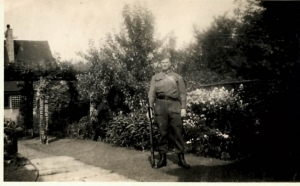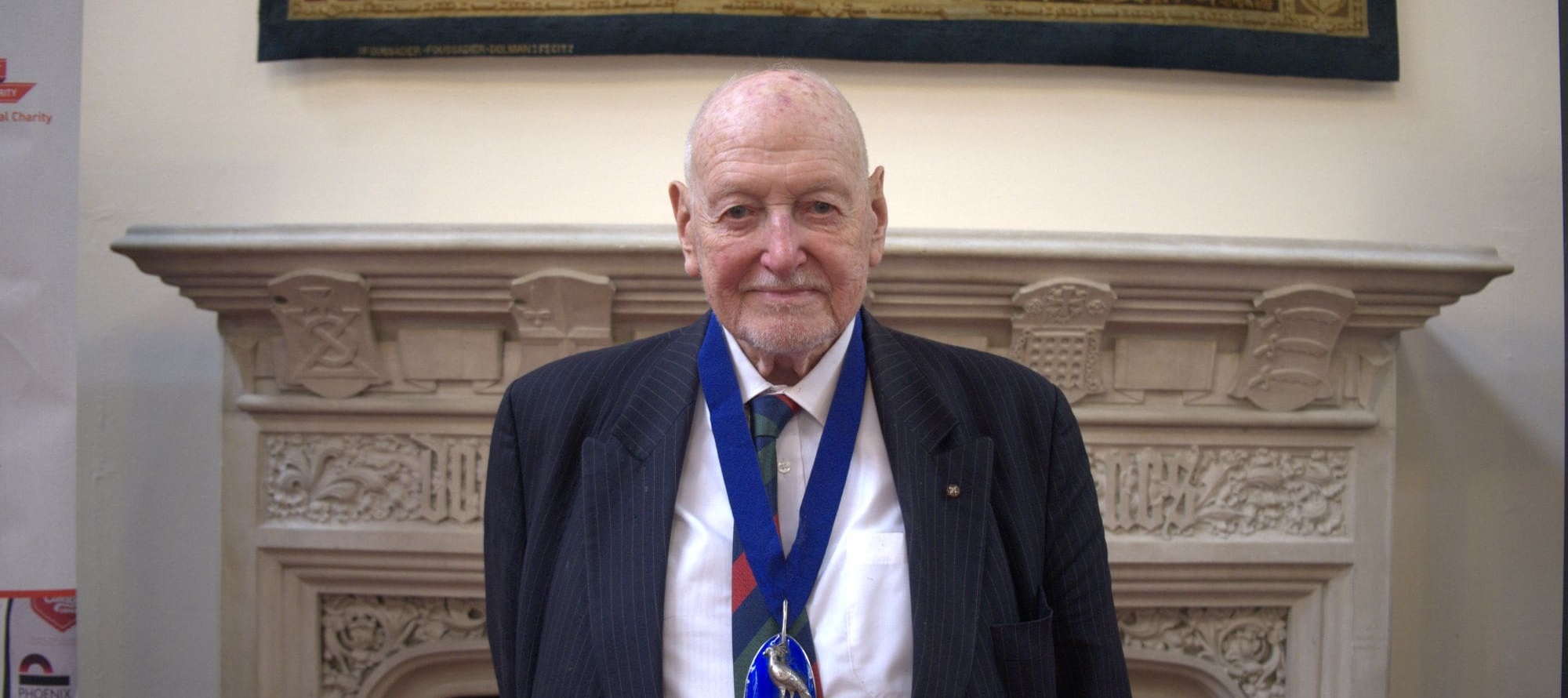“As a Royal Engineer, the Mulberry Harbours hold a special place in my heart. I’ve had the profound experience of walking along Gold Beach at Arromanches, where our troops landed on D-Day. As I stood there, I reflected on the sacrifices of the 4,000 brave soldiers who did not make it across the 200 yards of sand.”
Dr. David Wright MBE turned 90 in 2024. His father was in the Machine Gun Corps during the First World War, and he himself remembers sitting in the garden of his father’s friends during a weekend visit to Kent, captivated by the spectacle of the Battle of Britain unfolding in the sky above.
A regular supporter of the Army Benevolent Fund (ABF), Dr. Wright has generously pledged to leave the charity a gift in his Will. “Supporting people who have been through the stress of combat is important,” he said.
“Because of my father’s work, if the Battle of Britain had gone the other way my family probably wouldn’t be here.”
 Dr Wright’s Father, September 1942
Dr Wright’s Father, September 1942
Dr. Wright was born in Cheam, on 5th November 1934. His father was the secretary of a Jewish company (though he himself was a Gentile) and during the Second World War was a member of the Home Guard. “He received a Military Cross for his service in the First World War, but he was only 63 when he died,” said Dr. Wright. “I think that was the result of fighting in two world wars. It took its toll.”
“As I walked to my first school, if the air raid warning went off I’d knock on the door of the nearest house and ask to use their shelter. Bombing and rationing felt like natural parts of life,” he said. Dr. Wright’s boarding school was eventually evacuated to Aberystwyth during the war
A sporty child, Dr. Wright was a Gamesmaker at the 1948 London Olympic Games. He performed the same role over 60 years later, at London 2012.
“I’m part of a generation that had to do National Service,” Dr. Wright explained. “At just 18 I was in the Royal Engineers, instructing in bomb disposal, mine and atomic warfare. After two years I joined the Territorial Army and worked on removing mines from the beaches following the war, doing our best to make them safe.”
Dr. Wright qualified as a Chartered Secretary in 1962, rising to the top of the company he worked in for over 37 years. He married his wife, Prue, in 1971.
“Prue was a Chief Nursing Officer. She died in 2008, but even now people tell me amazing things she did for them, that I didn’t know anything about,” said Dr. Wright. “She went to work every day the same as me, saving lives. Then she cooked my dinner in the evenings as though nothing had happened.”
Dr. Wright now lives in Bishop’s Stortford. In 2000 he was awarded his MBE for services to the community of Harlow, where he and Prue had settled. “I helped set up a campus for the Memorial University of Newfoundland there,” he said. “I’m still a Trustee 50 years on, and the Chairman Emeritus.”
“I’m grateful for the life I’ve lived. I had wonderful parents and a wonderful marriage. Now I’ve got good friends, good neighbours, and I enjoy seeing people in church on a Sunday.”
“The fact that I’ve made it to 90 is surprising,” said Dr. Wright. “I’ve had cancer, I’ve got a pacemaker and my knees and hips have been replaced. There’s not much of the ‘me’ my mother gave birth to all those years ago! But I hope that people would say I was a helpful chap who was there when they needed support.”
Dr. Wright is the Chairman of the Machine Gun Corps Old Comrades’ Association and is involved in many other charities including the Royal Society for Blind Children, the Royal Engineers Association and the Royal British Legion.
“I’ve been a regular supporter of the ABF for decades,” he said. “Prue and I used to go to fundraising events together and I still give a donation each year.”
“I’ve always wondered how my father coped with the extreme stress and shock of the First World War. It’s comforting to know that the ABF is there for today’s soldiers, so they don’t have to suffer alone.”
“The support doesn’t have to be for major issues. Smaller things like advice on going for job interviews after you’ve left service, or money to buy a suit – it’s all important work,” said Dr. Wright. “I’m leaving a gift in my Will so I can contribute to things like that, big or small, after I’ve gone. If I can persuade others to do likewise, it will be a job well done.”

